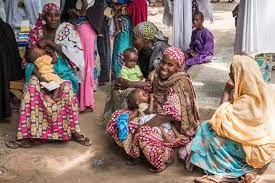
10 Factors Affecting Maternal and Child Health in Nigeria
Factors Affecting Maternal and Child Health in Nigeria – Maternal and child health in Nigeria is a major concern due to high rates of maternal and infant mortality. Several programs and policies have been implemented by the Nigerian government to improve maternal child health. Some of these programs include increasing access to family planning services, promoting skilled birth, and enhancing access to healthcare for pregnant women. Despite these efforts, challenges such as insufficient funding, lack of skilled healthcare providers, and limited access to healthcare in rural areas continue to limit the success of maternal and child health in Nigeria.
Read Also: Factors Affecting Distribution Of Crops In Nigeria
👉 Relocate to Canada Today!
Live, Study and Work in Canada. No Payment is Required! Hurry Now click here to Apply >> Immigrate to CanadaWhat Is Maternal Health?
Maternal health is the health and well-being of women during pregnancy, childbirth, and the postpartum period. It comprises a wide range of issues, including access to quality prenatal care, management of pregnancy complications, and support for emotional and physical recovery after childbirth. The main objective of maternal health programs is to reduce maternal mortality and also to ensure that women have a safe pregnancy and childbirth experience. Factors Affecting Maternal and Child Health in Nigeria
What Is Child Health?
Child health is the physical, mental, emotional, and social well-being of children from birth to adolescence. It entails a wide range of issues, including access to quality care, nutrition, education, and protection from danger or harm. The main aim of most child health programs is to prevent and treat illnesses or injuries, promote healthy growth of the children, and ensure that they have the opportunity to attain their fullest potential. This includes conducting immunization exercises, promoting a healthy diet and feeding, providing access to clean and portable water, and addressing social determinants of health that can negatively affect the health of the child.
Components Of Maternal And Child Health Care
Some components of maternal and child health care include: JAMB Portal
- Antenatal care: Antenatal care entails prenatal check-ups, education, and general support for pregnant women.
- Intrapartum care: This refers to care given to the mother during labor and delivery.
- Postpartum care: This entails care for the mother and baby immediately after birth.
- Newborn care: This has to do with care for the baby during the first 28 days of life.
- Immunization: Immunization entails protecting children against preventable diseases.
- Family planning: This involves providing education and various access to methods of contraception.
Read Also: 10 Environmental Factors in Nigeria
History Of Maternal And Child Health In Nigeria
The history of maternal and child health in Nigeria can be traced back to the colonial period when the British government set up a system of Western-style hospitals and clinics in the country. However, access to maternal and child health services remained limited, particularly in rural areas.NYSC Portal
After independence in 1960, the Nigerian government made efforts to improve this area of health by training more midwives and building several health clinics. However, a lack of political stability and funding hindered these efforts.
In the 1990s, the government and international organizations gave more focus to maternal and child health, and also enforced several programs and initiatives to improve maternal and child health services. Despite these efforts, the outcomes in Nigeria remain poor as the maternal mortality ratio is still high and children continue to die from preventable causes.Duties of a Production Manager
No doubt, there is still a long way to go, but the Nigerian government continues to work on improving maternal and child health, with the support of organizations such as the World Health Organization and the UNICEF(United Nations International Children’s Emergency Fund) and aims to ensure that all women and children have access to quality health care.
👉 Relocate to Canada Today!
Live, Study and Work in Canada. No Payment is Required! Hurry Now click here to Apply >> Immigrate to CanadaRead Also: Factors Affecting Education in Nigeria
Factors Responsible For Maternal Mortality In Nigeria
Several determinants contribute to high maternal mortality in Nigeria. Some of them include:
- Lack of access to quality maternal healthcare in rural areas: Most women in Nigeria, particularly those living in rural areas, have restricted access to basic maternal health services. Good Morning Love Message
- Insufficient funding and infrastructure: Nigeria has a shortage of healthcare facilities and trained healthcare professionals. This makes it difficult for women to access quality maternal healthcare.
- High rate of poverty: Nigeria has a high rate of poverty, as a result, it becomes difficult for women to afford the rising costs of maternal healthcare.
- Lack of proper education on maternal health: The majority of women in Nigeria do not have access to information on maternal health, as a result, they make poor decisions about their maternal health, which ultimately leads to death or loss of their life or the children.
Factors Affecting Maternal And Child Health In Nigeria
- Insufficient funding for health care: The Nigerian government does not allocate enough funds to the health sector, It appears there is not much regard for the lives of its citizens which affects the ability to provide quality maternal and child health services.
- Poor health facilities infrastructure: Many health facilities in Nigeria lack the infrastructure and necessary equipment needed to provide adequate maternal and child health care.
- The dearth of well-trained health workers: There is a shortage of skilled health workers, such as obstetricians and midwives, in Nigeria. This makes it difficult for women to receive the basic care they need during pregnancy and even childbirth.
- Cultural beliefs and Crude practices: There are some crude traditional beliefs and practices in Nigeria. One such is that pregnancy and childbirth are private matters and should be managed by traditional birth attendants. The implication of this is that access to quality maternal and child health care services will be affected.Duties of a Radiation Therapist
- Poverty and ignorance: Most women in Nigeria are living in poverty, and this makes it difficult for them to afford the rising costs associated with maternal and child health care.
Read Also: 10 Factors Affecting Judicial Review in Nigeria
- Restricted access to family planning services: Many women in Nigeria do not have access to information and services related to family planning, which can make it difficult for them to plan and space their pregnancies.
- Increased teenage pregnancy: Nigeria has a high rate of teenage pregnancy, of which the rate of moral decadence is a factor. This tends to increase the risk of maternal and infant mortality.
- High rate and continuous increase of HIV/AIDS: Nigeria has a high rate of HIV/AIDS, especially among its young people, and this can increase the risk of maternal and infant mortality.
- Inadequate emergency obstetric care: Most women in Nigeria do not have access to emergency obstetric care, which can be life-saving, especially in case of complications during pregnancy and childbirth.
- Lack of Political stability: Political instability affects the government’s ability to provide and fund child health services, It also affects the health care provider’s ability to provide services. Romantic Love Messages
Read Also: 10 Factors Affecting Immunization In Nigeria
Conclusion
In conclusion, maternal and child health in Nigeria remains a significant challenge, despite efforts by the government and several international organizations to improve the situation. The maternal mortality ratio (MMR) and infant mortality rate are still high, and lots of children continue to die from preventable causes. Additionally, some traditional and cultural beliefs, poverty, and illiteracy also play a role in hindering the progress of maternal and child health in Nigeria. The government and international organizations must continue to work together to ensure access to quality health care as it relates to maternal health. This can be achieved through ensuring adequate funding for health care, training more health care specialists, improving the health infrastructure, and addressing cultural beliefs that impede access to good health care.
Check JAMB RESULT
Check and Confirm: How much is Dollar to Naira







